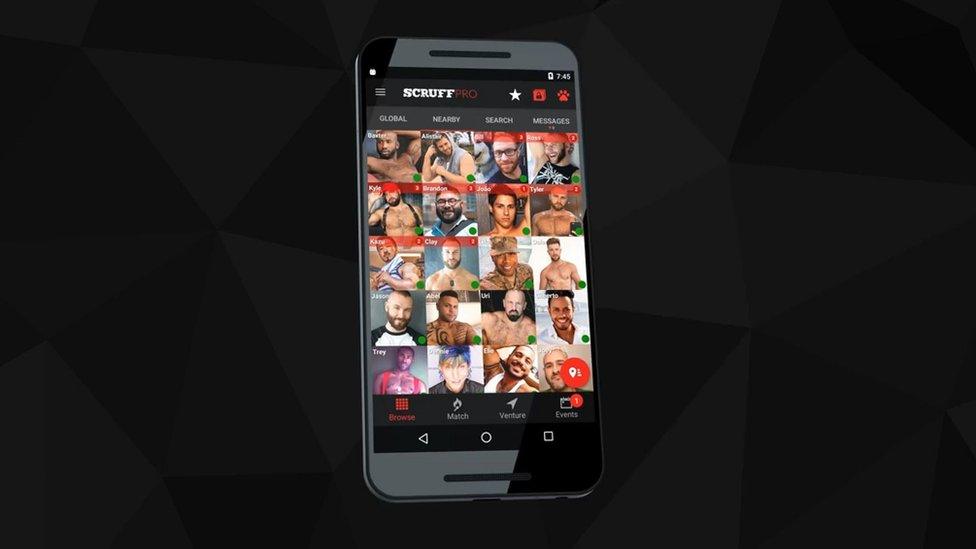Scruff gay dating app bans underwear photos
- Published

Gay dating app Scruff has banned images of men in underwear or swimming trunks, after it was suspended from the Google Play app store several times.
Scruff said it had changed its profile picture rules after "repeated suspensions by app store distributors" but declined to specify which stores.
The app was most recently suspended from Google Play in January, when it disappeared for three days.
Google told BBC News it did not comment on individual apps.
Several Scruff members responded to the policy change on social media, threatening to delete their accounts.
"Craigslist, Backpage, Tumblr, now even Scruff, a gay dating app you have to be of consenting age to use, is censoring how its users can post photos? This isn't looking so good guys," said vlogger Amp Somers, who runs the sex education YouTube channel Watts The Safeword, which has 170,000 subscribers.
'Explicit content'
Scruff is a social network and dating app for gay, bisexual and trans men. Members can browse a grid of profiles and speak to people in their area, or explore other locations.
However, it has disappeared from Google Play several times in recent months.
In a blog post, external that referred to the app's temporary disappearance from Google Play in January, the company said: "Had this removal been permanent, it would have been devastating to our company and our community."
It had now enacted "wide-ranging changes to its profile photo content guidelines" in order to "ensure continued and full compliance", the blog post added.
The company also told BBC News it took content moderation seriously.

Scruff is a location-based social network
Google declined to tell BBC News why Scruff had been removed from the app store several times.
Part of the challenge facing Scruff and similar apps "is the fact that different app stores publish guidelines with varying degrees of specificity", chief executive Eric Silverberg told BBC News.
Google does publish a policy for app developers regarding sexually explicit content but it is very short and subject to interpretation.
While images of sex toys, sex acts and sex with animals are expressly forbidden, the policy otherwise bans only "sexually suggestive poses".
Prior to the change, Scruff's policies already forbade:
suggestive or explicit sexual acts
exposed buttocks
covering the genitals with hands, towels or other objects
Its updated policy also bans:
photos taken in the shower
photos in swimming trunks or underwear
lowering the waistband to draw attention to the groin
Last week, when the updated policy was introduced, it also banned photos of "hugging and kissing" but his has now been changed to "sexually suggestive embraces" following criticism from its members.
Scruff said existing profile photos would be rechecked to ensure compliance with the new policy.
Rival policies
Rival dating app Grindr does not allow underwear photos but does allow swimwear "in context", such as photos taken on the beach.
Tinder's profile guidelines do not give specific examples but do state "no nudity, no sexually explicit content".
Both Grindr and the LGBT social network Hornet told BBC News they had not been suspended from Google Play.
The fetish app Recon is not available on Google Play, although a tamer version of Recon, which filters more explicit profile images, is available on Apple's App Store.
While Google declined to comment, it made clear that its moderators did not discriminate based on sexuality or gender identity.
Held to account
In his blog explaining the new policy, Mr Silverberg said the criticism from its members was "not unfounded".
"Given that Scruff is a community that speaks openly and positively about sex, bodies, and intimacy, some feel that such policies are at odds with those values," he wrote.
"Scruff respects the concerns voiced by our community on this matter, and we encourage everyone to continue to hold us, and all tech companies, accountable for the content and conduct standards we enforce."